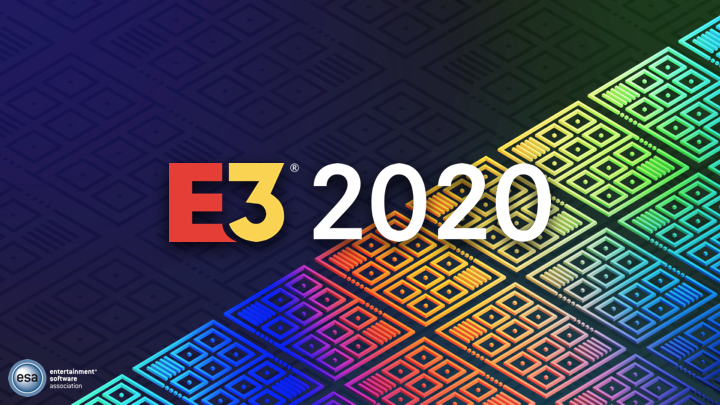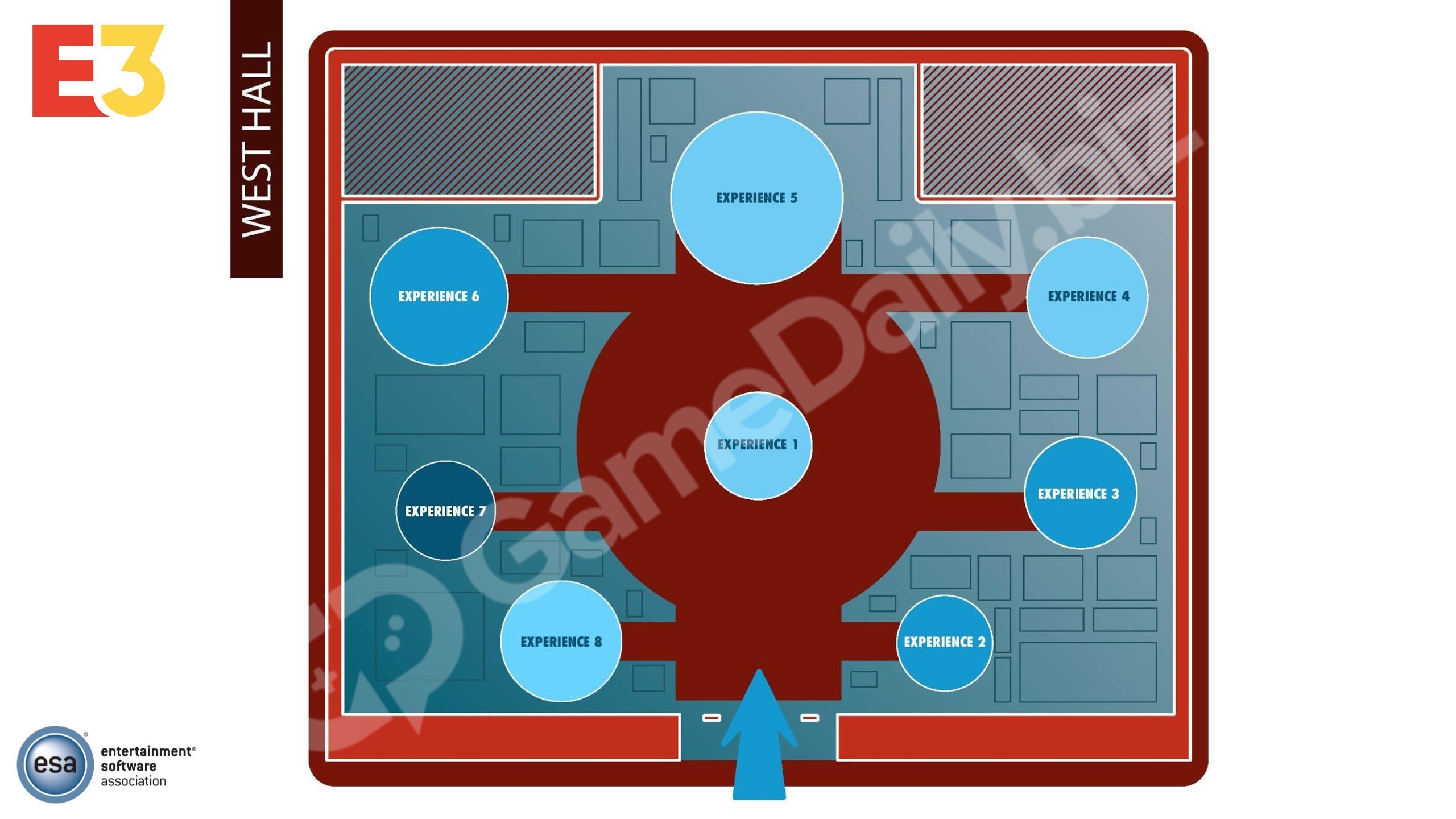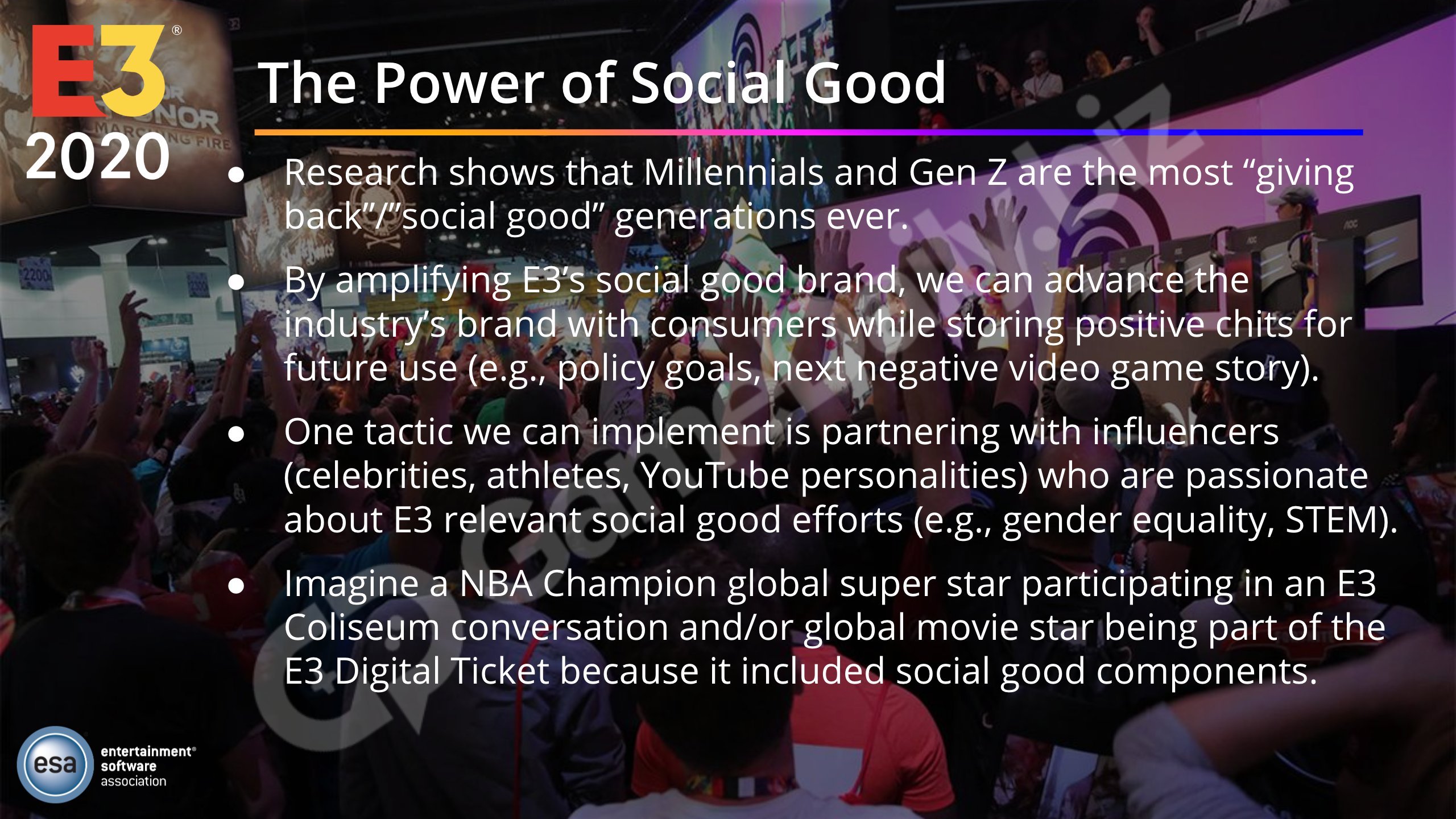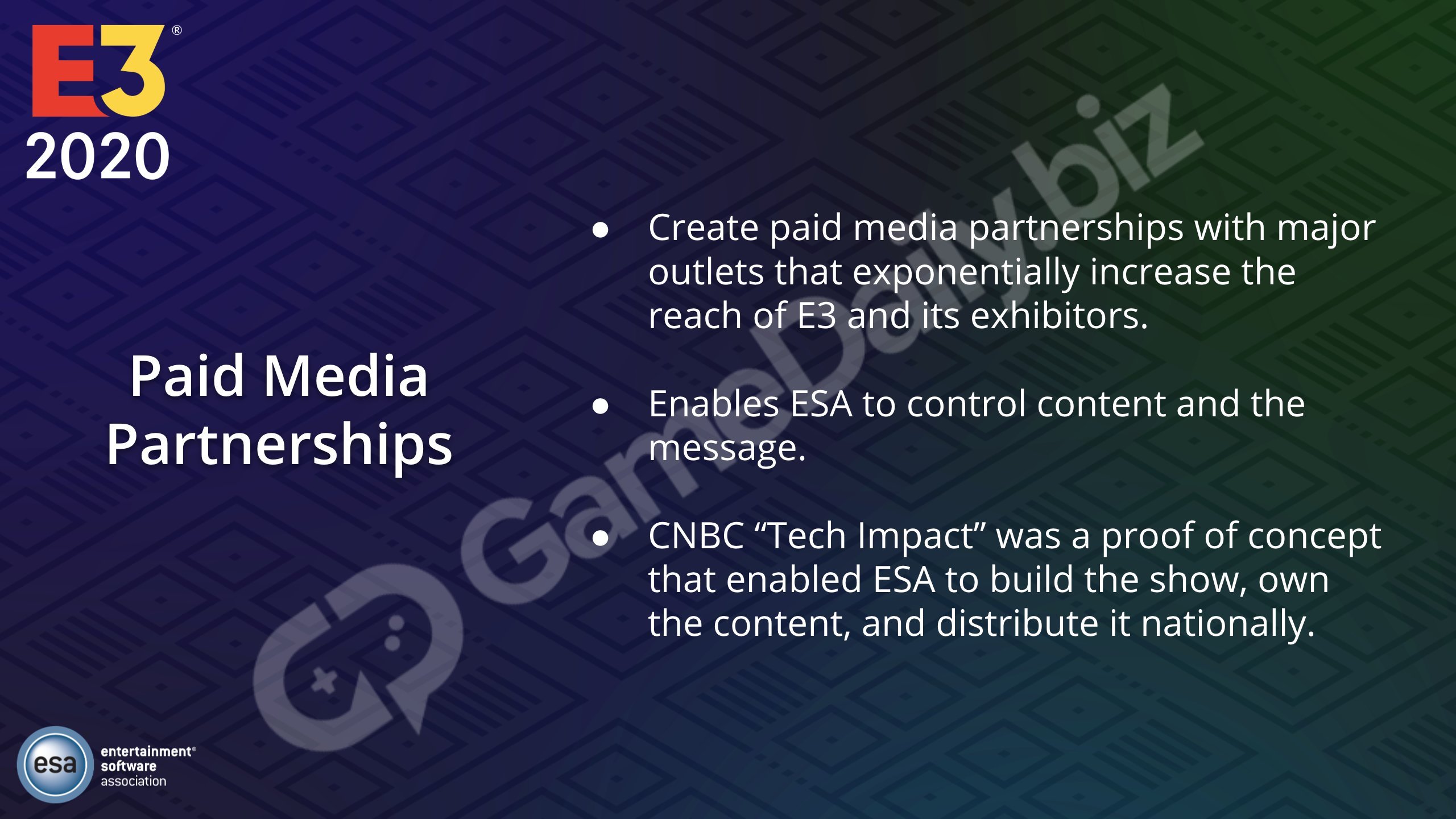
The ESA is trying to rebrand E3 as a “fan, media, and influencer festival” for next year’s event.
In a pitch deck intended for the lobbying group’s members (last updated August 16, 2019), the ESA says it has plans to adapt its offerings in response to feedback gathered from publishers. As part of its overhaul, the group proposes leaning into influencers and paid celebrity deals with talent representation agencies like UTA and CAA.
The deck includes two examples of these high profile celebrity activations, including members of the Los Angeles Lakers playing a basketball video game in front of fans or actors competing in a tournament. These attractions rely on a massive change to the E3 show floor.
The presentation includes a sample of what the LA Convention Center’s West Hall might look like with eight “experience” hubs” in the middle of traditional booths (see below for proposed floor plan and E3 2018 West Hall floor plan). ESA members voiced approval for the new floor plan.


The lobbying group says it hopes to create “exclusive/appointment only activations for select attendees who will create buzz and FOMO.” ESA members shot down the idea of paying celebrities though, according to three slides labeled “Member Decision Points.” Celebrities will be invited through an organized program, instead.
Industry attendees, including media, should be aware that the ESA membership approved an additional 10,000 gamer badge attendees, bringing the total number of consumers on the show floor to 25,000. The E3 schedule may be reconfigured with an industry-only day on Tuesday (traditionally the first day of E3 activities at the LA Convention Center), before opening the doors wide to ticketed members of the general public on Wednesday and Thursday.
Even with an additional 10,000 people, E3 won’t come close to the largest industry events around the world. With fortuitous timing, Niko Partners senior analyst Daniel Ahmad shared the following attendance statistics for major conventions this year:
Biggest gaming exhibitions / trade shows of by number of entries:
Gamescom 2019: 373k
ChinaJoy 2019: 365k
Brazil Games Show 2018: 325k
Taipei Game Show 2019: 320k
Paris Games Week 2018: 316k
Tokyo Game Show 2019: 262k
G-Star Korea 2018: 235k
…..
E3 2019: 66k— Daniel Ahmad (@ZhugeEX) September 16, 2019
The ESA membership is not aligned with the lobbying group that E3 should be a consumer event. The lobbying group’s publisher partners shot down an idea for a PlayStation Experience-like movie theatre experience. However, there are a number of consumer-focused plans on the table. A proposed digital app and experience may help mitigate wait times. On paper, this reads like Disney’s FastPass system used in its amusement parks. Users will register for a demo time window and come back later to avoid waiting for hours at a time for a single game.
The ESA does have plans to take advantage of those long demo wait times, though. The group has plans for what it calls “queuetainment” to market to those in line. This two-pronged approach creates a rich opportunity for E3 exhibitors. Either they will have access to consumer data captured through the app or have a captive audience as people wait in line for demos.
Another aspect of the deck proposes leveraging social consciousness to promote E3. In a series of slides called “The Power of Social Good,” The ESA suggests exploiting Millennial and Generation Z propensity for giving back. “By amplifying E3’s social good brand, we can advance the industry’s brand with consumers while storing positive chits for future use,” the slide says.

A later slide on the topic suggests that the ESA could engage influencers by offering them attention and access to support charitable efforts in lieu of compensation. In return, influencers would provide the industry “validation, attention, and excitement across media outlets beyond the video game space.”
One curious note in the ESA’s E3 2020 deck is a proposal to engage in new paid media partnerships. While this might be interpreted as common advertising purchases, the ESA specifically calls out that it funded segments on Tech Impact, a show that ESA says runs on CNBC (the show website indicates it airs on Fox Business and Bloomberg Television). Those episodes, available via the Tech Impact website, do not carry any disclosure or obvious notation that the content was a paid promotion by the lobbying group. A small note at the bottom of the Tech Impact says “sponsored program,” but the disclosure is not included on the episode listing or disclosed in the video segments published on that page.

Earlier this year, the ESA suffered a major data breach, leaking the personal information of 2,000 E3 2019 media, influencer, and analyst attendees. It was later discovered the breach was much worse than the ESA originally admitted. Additionally, the group had been notified that its lax security policies were exposing user data almost a year earlier.
In response to GameDaily’s reporting, the ESA said its top priority was to win back trust of its media partners. The organization has not provided any detail on those efforts since the data breach was discovered in early August.
The ESA did not respond by publish to our inquiries about this document or its plan to earn back industry trust following the data breach. The full pitch deck is embedded below.
The ESA has been under pressure with regard to E3 for a number of years now. EA moved its fan event to North Hollywood before the beginning of E3 proper. The Xbox presence is largely in the Microsoft Theatre across LA Live. Sony didn’t participate this year. Activision wasn’t on the show floor. And the organization has infuriated every member of the media, influencers, and analysts that attended this year.
This latest overhaul turns E3 into a Gamescom-like show. There’s more focus on catering to consumers. Media will have its own day (though not its own business area, like in the Cologne, Germany show). The event will no longer be a trade show at all, but a “festival.”
None of this fixes the core problem, though. Publishers — ESA’s members — don’t need the LA Convention center to reach media and influencers. They don’t need one week, when the entire year includes media events and consumer conventions. E3 can still have value, but as the ESA continues to push the event toward a consumer focus, it is in conflict with the majority of members that do not want it to be yet another event for players.
This is an identity crisis that “queuetainment” and celebrities aren’t going to fix.
E3 Strategy Deck Updated by GameDaily.biz on Scribd
This story has been updated 9/17/2019.
 GameDaily.biz © 2026 | All Rights Reserved.
GameDaily.biz © 2026 | All Rights Reserved.